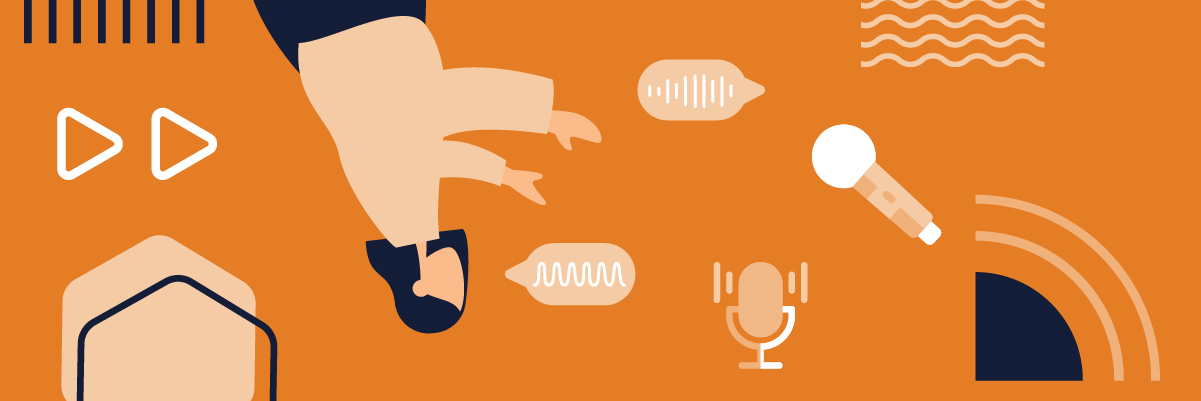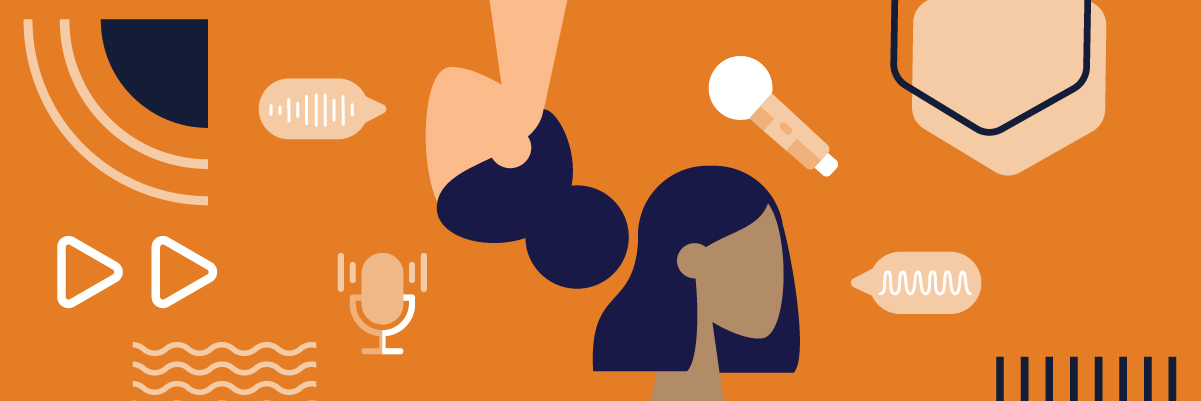Is your voice one the world should hear? Do you have ideas that you can’t wait to share or creative content, stories, and insights that would make an impact? Are you a born entertainer with a knack for storytelling? Maybe you’ve been wondering how to become a podcaster, and you’re ready to get started. Podcasting is a great place to be right now, and there’s room for you and your podcast. And, here we are with all the details and insight to get you and your new show rolling. The world is ready to hear you; it’s up to you to give them what you have!
Let’s get you a podcast!
Everyone loves a podcast and with all the different genres, there’s always an open niche. Whether you love gaming, Game of Thrones, board games, or game-changing science, you can host a podcast. However, it’s not as easy as recording yourself and hitting the publish key, but it’s not so hard, either. Read on to find all about how to become a podcaster, from concept to editing, and we can be with you every step of the way. Let’s go!
Concept, Format, and Title
It’s one thing to think about how to become a podcaster, it’s another to have a great idea, a clean format, and a catchy title. So let’s start at the very beginning. What do you want your podcast to be about? What’s the concept? And yes, these are two very different questions. Maybe your podcast is about dogs, but your concept is acclimating abused dogs into a safe and happy home. It’s important to have a concept so you don’t go all over the place with your idea.
When it comes to podcast format, you’ve got a few choices. And sure, you can change it up sometimes, but overall, it’s a good idea to stay within a set format. Your listeners will appreciate the consistency there. Perhaps you want a 30-minute show where you do all the talking. Maybe you’d rather go with an hour-long show featuring guests who you interview. Don’t forget the possibility of co-hosting a podcast – people love the great banter and how hosts can bounce ideas around. Choose what works for you; this is your podcast after all.
Now the title! The trick to choosing a great podcast title is don’t be too generic but don’t be too specific or even too creative. The title should be indicative of your show. So don’t just call your show All About Dogs, but don’t go to How to Acclimate Abused Dogs in Safe Homes for Happy Years to Come. Maybe something more in the middle, like Second Chance Dogs or Rehoming Dogs to Happy Homes. Don’t leave your audience guessing what your show is about. Think about running through Spotify and seeing a show title that catches your eye. That’s what you want. We love the reference of a podcast title as a welcome mat to your show. Next, open the door for your audience and welcome them in.

The Script
This is so exciting! It’s time to write your podcast script! No matter how good you are at talking, make sure to have a good script, especially when you are first getting started. You may think you can just go with the flow, but even the most natural-sounding podcasters work with scripts. Your script should have certain points, and it can be word for word, general ideas, or even bullet points. Whatever works best for you is the way to go.
- Word-for-word script – A word-for-word script can be a great guide, especially when you want to say things a certain way. However, be careful you don’t sound like you’re reading. A podcast should sound natural and conversational, not forced or stiff. This type of script can also translate to written content, like show notes or website material.
- General ideas – This type of script leaves a little more leeway for you to let your gift of gab shine. With some detailed notes, but not word for word, you’ll know what you’re saying and when you’re saying it, but you’ve got some flexibility and can tweak as you go.
- Bullet points – Here you’ve got the bones in front of you and you get to add the meat to them as you go. Some podcasters love this format because it leaves a lot of room for creativity, ad-libbing, and a fluid, organic feel to the show.
When you’re first getting started, you may choose a word-for-word script, and then as you get the hang of it, you can shift script formats. Remember, it’s your show, do what works for you! And if it doesn’t work at first, change it up.
Where the magic happens
Now you’ve got to think about your recording space and the equipment you’ll be using. The charm of podcasting is you don’t need a big fancy studio or top-of-the-line, knock-out equipment. But you do need to plan ahead and not record in your driveway while the trash truck is going by.
For your space, think about the quietest area in your home. It doesn’t have to big, and some people even prefer the smaller spaces (closets are often go to spaces).
- Quiet is key, and if you have a room with no windows or shared walls, that’s your best bet. Some people even like to bring in extra pillows and blankets to absorb sound. You can go the fancy route for softening the sound and think about some acoustic panels.
- Consider the time of day, too. If you have dogs who love to bark while people take their morning walks, wait till the walking is done. Is dinner time a little crazy around your house? Well, it makes sense not to try to record then, right?
- Also, let your roommates and family know when you’re recording so they don’t bother you. We don’t want doors opening and shutting and hearing “Hey, what are you doing over there?”
When it comes to equipment, we love a good mic test. And it’s not just the mic you have that’s important, but you probably want a good pair of headphones, too. You need something to record on, whether it’s your laptop or yes, you can use your phone. Along with that, you’ll need recording software like Garageband or Audacity. Don’t forget a mixer to blend everything together for a smooth sound. Of all the equipment, it’s probably the mic that will make the most difference, so spend a little time looking into that.
Recording and Editing
Now for the fun part! It’s time to take all these tools and create the magic! Use your ideas, your script, your equipment, maybe even your guests, and record away! Have fun with it and don’t be afraid to try new things, as long as you can edit. You’ll need to edit anyway, so don’t be afraid of mistakes. Editing will clean up extra noise, cut out stutters, and keep your podcast within your timeframe.
Many people choose to go with professional editing services for a great result. This can refine your podcast and take it up a level. When you listen to podcasts, you can often tell a difference from the first shows and see the transgression as the show becomes more professional. Often this is a combination of better equipment and better editing. We’d love to help here, so just hop on over and see what we can do!
Editors can also pop in the components we’re about to read about, like music and sound effects. They’ll create smooth transitions with your outros and intros so your show never seems choppy or awkward. Editing is where all the pieces and parts come together to make a cohesive, captivating show, like spreading that smooth, beautiful icing over your favorite, freshly baked cake.
Artistic Components
When it comes to how to become a podcaster, don’t forget the artistic components. This includes all those lovely extras that connects your audience, creates a brand, and forms a cohesive bond throughout the podcast. We recommend including these components in your podcast:
- Music – A great personalized piece of music can speak volumes to your podcast. When you include it in your intros and outros, you connect the podcast from beginning to end. It can signal your audience, Let’s get started and Goodbye for now. When incorporated within the podcast, it’s a great little break without losing attention.
- Cover art – This is that awesome piece of eye-catching branding that will get your podcast noticed. It may even end up on t-shirts and stickers on someone’s laptop or water bottle. When podcast cover art is simple, refined, and connects to the vibe of your show, you’re on the right track. Font, graphics, and colors all play an important role here.
- Sound effects – How fun would it be to pop in some sound effects? Whether you want squeaky doors in your horror show or dogs barking in that rehoming show, a few sound effects will add a bit of fun to your show. They’ll create an engaging and immersive experience your audience will love.
And…Bunny Studio can help!
If you’re wondering how you’re going to put all of these pieces and parts together, don’t worry! We’ve got you!
Our great pros here at Bunny Studio can handle any piece of your podcast you’d like a little help with.
From editing to sound effects to voice-overs or even your scriptwriting, we’ve got pros in all the areas! We can help as little or as much as you want, and we can get your new podcast ready to go or tidy up the one you’re already working on. This also lets you concentrate on the parts you love doing, and we can handle those, ahem, not so fun parts for you.
Just reach out to us and hire a podcast creator or any other pro. Check out some of our client reviews, and you’ll see how we really deliver. Let’s get your voice out there for the world to hear!










